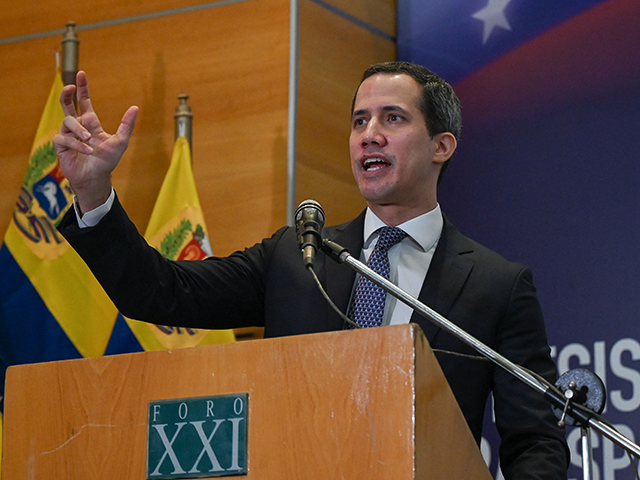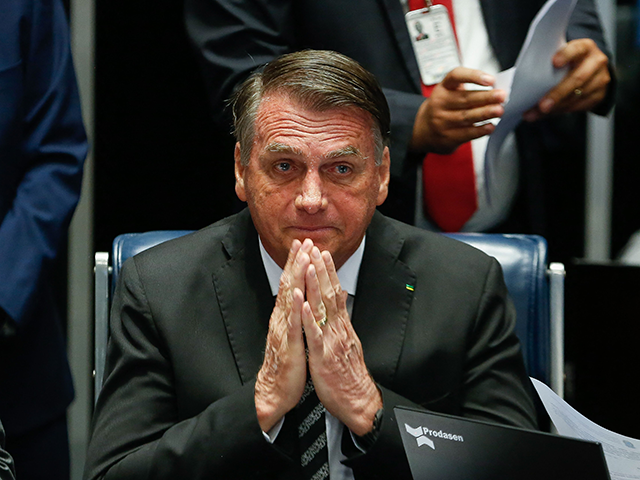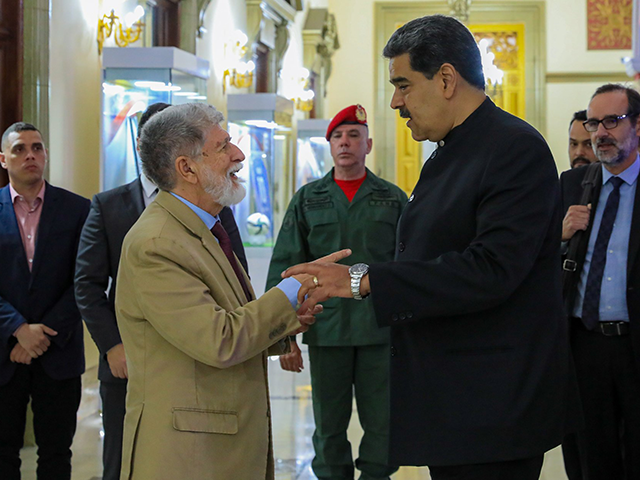CARACAS, Venezuela – Brazilian radical leftist President Luiz Inácio Lula da Silva sent his top foreign policy adviser Celso Amorim to Caracas this week to meet with socialist dictator Nicolás Maduro and the establishment “opposition” in Venezuela.
Amorim reportedly scheduled talks with Maduro for Wednesday, then met with establishment “opposition” leaders on Thursday.
According to Reuters, which cited unnamed Brazilian government officials, Amorim’s trip to Caracas — which was kept a secret — sought to establish dialogue between the Maduro regime and the Venezuelan “opposition” in advanced of expected “elections” in 2024.
The encounter became public after Maduro posted photos on his official Twitter account, describing the meeting as “pleasant.”
“I had a pleasant meeting with the delegation of the Federative Republic of Brazil, headed by Celso Amorim,” Maduro wrote. “We are committed to renewing our union and solidarity mechanisms that guarantee the growth and well-being of Venezuela and Brazil.”
Brazilian President Lula da Silva — who during his previous two presidential terms (2003-2010) was a key ideological ally of Hugo Chávez and his socialist regime — ordered to immediately restore Brazil’s diplomatic ties with Venezuela on January 1, the first day of his presidential term.
Amorim’s visit to Caracas is the first high-level meeting between both countries after they restored diplomatic relations.
Brazil, under the presidency of Lula’s predecessor Jair Bolsonaro, had broken off diplomatic relations with the Maduro regime in response to gross human rights violations under it, including the execution of a sham presidential election in 2018. Much of the free world did not recognize Maduro as the winner of that election and stopped recognizing him as head of state of the country at the end of his first presidential term in January 2019. That election prompted opposition leaders to declare Maduro’s persistence in the presidential palace a constitutional “rupture in the democratic order,” allowing for his replacement by the National Assembly. The lawmaking body thus designated opposition leader Juan Guaidó as Venezuela’s interim president.

Venezuelan opposition leader Juan Guaido delivers a speech during a press conference in Caracas, on September 16, 2022. (FEDERICO PARRA/AFP via Getty Images)
Under Bolsonaro’s presidency, Brazil was among the group of over 50 countries that recognized Guaidó as Venezuela’s legitimate president and, by 2020, Brazil had withdrawn all of its diplomatic personnel from Venezuela. Bolsonaro also banned Maduro and any senior official of the Venezuelan socialist regime from entering Brazil; the ban was lifted by Bolsonaro at the tail-end of his presidency on December 30.
Guaidó’s interim government, which failed to oust Maduro or hold any power in the country, was dissolved by the Venezuelan opposition-led National Assembly in December, leaving Maduro’s regime as the sole uncontested government of Venezuela.

Former Brazilian President Jair Bolsonaro gestures during a session of the National Congress to enact amendments of the Constitution to increase social benefits in Brasilia, on July 14, 2022. (SERGIO LIMA/AFP via Getty Images)
Sources from the Brazilian Foreign Affairs Ministry told the Brazilian news network G1 on Thursday that the encounter between Maduro and Amorim is a “natural step” in the process of reopening the Brazilian embassy in Caracas.
“The moment you reopen an embassy, you send a high-level mission into the country,” one of the sources explained to G1.
Brazilian newspaper O Globo reported on Thursday that the matter of Venezuela’s outstanding debt to Brazil was also discussed between Amorim and Maduro. According to O Globo, Venezuela owes around $1 billion to Brazil; 80 percent of the debt is owed to the Brazilian Development Bank (BNDES). A portion of the debt, totaling around $100 million, is due soon, which has reportedly prompted conversations within Lula’s government on how to deal with the matter.
Amorim, who had previously served as Brazil’s Minister of Foreign Affairs during Lula’s first two presidential terms (2003-2010) and during the presidency of Itamar Franco between 1993-1994, also reportedly met with Gerardo Blyde, a representative of Venezuela’s establishment “opposition.”
Blyde, a former lawmaker and member of the Justice First “opposition” political party, currently leads the opposition’s negotiating team with the Maduro regime. The alleged negotiations reportedly include the subject of holding “free and fair” presidential elections in 2024 but have so far resulted in no tangible agreements or positive changes for Venezuelans. The conversations have been frozen since November, after both sides signed an agreement granting the Maduro regime control of $3 billion of the nation’s roughly $27 billion frozen overseas bank account assets.
The Maduro regime reiterated on Thursday that there will be no agreement with the “opposition” — including holding “free and fair” elections — until all sanctions imposed upon the Maduro regime by the United States, the European Union, and other countries are first rescinded.
CNN Brasil reported on Thursday that they were informed by advisors of Juan Guaidó that they were unaware of Amorim’s visit to Caracas.
Christian K. Caruzo is a Venezuelan writer and documents life under socialism. You can follow him on Twitter here.

COMMENTS
Please let us know if you're having issues with commenting.